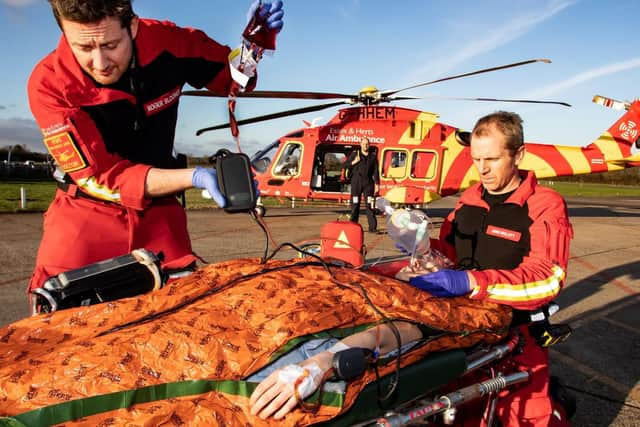Air Ambulance covering Dacorum launches new appeal to help keep blood supply flowing
and live on Freeview channel 276
Essex and Herts Air Ambulance (EHAAT) is looking for 60 people to help it raise £30,000, so that the charity’s critical care teams can continue carrying blood to patients who need it most.
Each year EHAAT treats approximately 60 people in need of a potentially life-saving blood transfusion at the scene of an incident.
Advertisement
Hide AdAdvertisement
Hide AdOn average it costs EHAAT around £500 to help each of these patients in need of blood, so it is appealing for 60 people to donate £500 each to get to the £30,000 needed to keep flying blood to those who need it most.


EHAAT’s Blood Project Lead Laurie Phillipson said: “Being able to give a transfusion at the scene of an incident can be a life-saving intervention for patients suffering significant bleeding.
"Our pre-hospital critical care teams can provide this rapidly and safely before the patient reaches hospital.”
EHAAT’s helicopters and rapid response vehicles carry packed red blood cells of blood group O Negative, meaning they can be used on any patient. When required, these are given with plasma, the other major component of human blood.
Advertisement
Hide AdAdvertisement
Hide AdThe packed red blood cells are supplied daily from The Princess Alexandra Hospital in Harlow and delivered to EHAAT’s airbases at Earls Colne and North Weald by riders from Essex Voluntary Blood Service (EVBS). The blood is replaced daily and replenished as required.
The blood is delivered and stored in special insulated boxes that keep the blood at a cool temperature for at least 24 hours.
These are fitted with a data logger that indicates if the temperature is trending outside of the correct range. If unused after 24 hours the blood is returned for use elsewhere, preventing any wastage of this precious commodity.
When the blood is required, it is warmed to body temperature to make it safe to administer to the patient and prevent unnecessary cooling of the patient.
For more information about EHAAT’s Blood on Board Appeal click here.